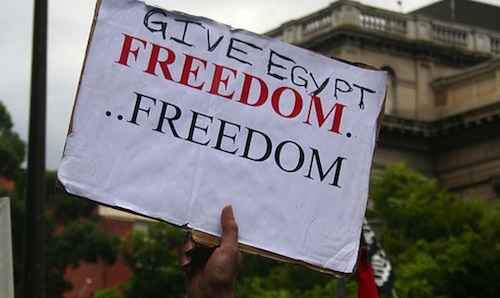
Social media tools and the Internet will play little role in overthrowing repressive governments in Southern Africa. That’s the view of veteran newspaper editor Mathatha Tsedu, who was speaking to a gathering of African journalists in Johannesburg on Friday on whether North African-style uprisings could spread to the region.
Tsedu says that even in countries such as Tunisia and Egypt, where social networks such as Facebook and Twitter were seen as instrumental in helping protestors organise popular uprisings that led to the departure of the leaders of those countries, technology was secondary to the fact that their militaries helped engineer change.
In Southern Africa, Internet penetration is limited. “Although technology helps it is not the panacea for all revolutions,” Tsedu says. It’s “hard work on the ground and a determined population that feels it has nothing to lose” that leads to change, but even then it’s the “attitude of the security forces” that plays a much more important role, he says.
“In Swaziland, [recent] attempts to organise were crushed with brute force,” Tsedu says. “The economic crunch there is beginning to bite, but whether it will lead to the exit of the playboy monarchy is too early to tell. The prospect of successful North African revolutions is extremely dim.”
Turning to Zimbabwe, Tsedu says the attitude of the Zimbabwean army and the security forces more generally will be a “serious determining factor” in future of the Robert Mugabe regime. “At the moment, the army still sees benefits in holding onto the state and enriching itself through that state.”
He says the Zimbabwean situation hasn’t reached a point where that country’s army “will turn around and oppose [Mugabe] or tell [him] it’s time to go.”
In North Africa, change has also happened not so much because communications technology fuelled uprisings but because the militaries in countries such as Tunisia and Egypt told their leaders to go. “The key to [former Egyptian president] Hosni Mubarak’s fall was the army telling him … that it was time,” Tsedu says.
In Yemen, despite similar use of technology to protest against the regime of Ali Abdullah Saleh, “progress of the revolution has been slow”. The same is true for Syria and Libya, he says. “The dictators are not yielding. Social media and Web journalism … may bring people into the streets, but other ingredients are important.”
Tsedu was speaking at a media forum as part of the annual CNN-MultiChoice African Journalist Media Awards. — Duncan McLeod, TechCentral
- Image: Takver
- Subscribe to our free daily newsletter
- Follow us on Twitter or on Facebook

